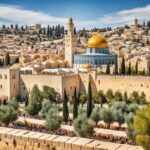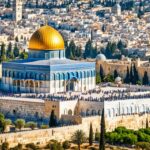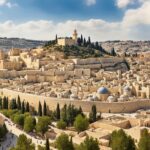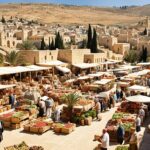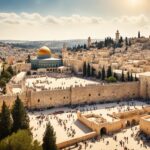Jerusalem, a city with a rich history that spans thousands of years, holds immense biblical importance and is considered a holy city by three major religions – Judaism, Christianity, and Islam. It has been the center of religious worship, the capital of the Kingdom of Israel, and the site of major biblical events. Today, Jerusalem continues to attract millions of tourists who come to explore its cultural heritage and experience its vibrant atmosphere.
Throughout the Bible, Jerusalem is mentioned numerous times and is associated with significant biblical figures and events. King David, King Solomon, Jesus, and Muhammad are among the notable figures linked to Jerusalem. The city served as a hub of religious and political life in biblical times and witnessed the construction of the First and Second Temples, the crucifixion of Jesus, and the ascension of Muhammad.
In biblical times, Jerusalem was a thriving city with a strategic location, fortified walls, and a central role in religious worship. It attracted people from different regions and was a symbol of power and cultural exchange.
Today, Jerusalem offers a wealth of attractions and landmarks that showcase its historical and religious significance. Visitors can explore iconic sites such as the Western Wall, the Church of the Holy Sepulchre, and the Dome of the Rock. The city is also known for its vibrant cultural scene, where Jewish, Christian, and Muslim traditions coexist.
Key Takeaways:
- Jerusalem holds immense biblical importance and is considered a holy city by three major religions.
- Notable biblical figures linked to Jerusalem include King David, King Solomon, Jesus, and Muhammad.
- In biblical times, Jerusalem was a thriving city with a central role in religious and political life.
- Major biblical events in Jerusalem include the construction of the First and Second Temples, the crucifixion of Jesus, and the ascension of Muhammad.
- Today, Jerusalem offers a variety of attractions and landmarks that showcase its historical and religious significance, as well as a vibrant cultural scene.
The Biblical Importance of Jerusalem
Jerusalem holds significant biblical importance as it is mentioned numerous times in the Bible. It is referred to as the “City of David” and is associated with the Ark of the Covenant.
In the accounts of David’s conquest of the city and the establishment of Jerusalem as the capital of the Kingdom of Israel, Jerusalem is mentioned. The city is also mentioned in the accounts of Solomon’s construction of the First Temple and the dedication of the Temple. Additionally, Jerusalem is mentioned in the prophecies of Isaiah, Jeremiah, and other prophets.
The biblical importance of Jerusalem is central to the religious beliefs and practices of Jews, Christians, and Muslims.
Key Biblical References:
- 2 Samuel 5:7 – “Nevertheless, David took the stronghold of Zion, that is, the City of David.”
- 1 Kings 8:1 – “Then Solomon assembled the elders of Israel and all the heads of the tribes, the leaders of the ancestral houses of the Israelites, before King Solomon in Jerusalem, to bring up the ark of the covenant of the LORD out of the city of David, which is Zion.”
- Isaiah 2:3 – “Many peoples shall come and say, ‘Come, let us go up to the mountain of the LORD, to the house of the God of Jacob; that he may teach us his ways and that we may walk in his paths.'”
“Jerusalem is a city that holds immense historical and religious significance. Its rich history, biblical importance, and cultural heritage make it a captivating destination for travelers.”
Throughout the Bible, Jerusalem is portrayed as a sacred city, deeply intertwined with the faith of believers. Its mention in various historical and prophetic accounts establishes its significance as a place of divine encounter and fulfillment of religious prophecies.
| Religion | Key Figures |
|---|---|
| Judaism | King David, King Solomon, Prophets Isaiah and Jeremiah |
| Christianity | Jesus, his disciples, early apostles |
| Islam | Muhammad, early Islamic scholars |
The biblical importance of Jerusalem continues to inspire pilgrimages and religious devotion, making it a significant destination for believers of different faiths seeking to deepen their spiritual connection to the historical and holy sites of the city.
Notable Biblical Figures Linked to Jerusalem
Jerusalem, known as the “City of David,” has deep connections to significant biblical figures who have left an indelible mark on its history. From the revered King David to the pivotal figure of Jesus, and the esteemed prophet Muhammad, these notable individuals have shaped the religious and cultural landscape of Jerusalem.
King David, known as the founder of Jerusalem, played a critical role in establishing the city as the capital of the Kingdom of Israel. His reign marked a period of prosperity and religious significance for Jerusalem. King Solomon, David’s son, is celebrated for constructing the First Temple in Jerusalem, a magnificent edifice that became a symbol of divine worship.
Jerusalem also holds immense importance for Christians, as it is the city where Jesus spent his final days, including his crucifixion and resurrection. The events that unfolded in Jerusalem during that time have profound significance for Christian theology. Additionally, Jerusalem holds a special place in Islamic tradition, as it is believed to be the location from which the Prophet Muhammad ascended to heaven during the Night Journey.
The Notable Biblical Figures Linked to Jerusalem:
- King David – Founder of Jerusalem
- King Solomon – Builder of the First Temple
- Jesus – Crucifixion and resurrection
- Prophet Muhammad – Ascension to heaven
The presence and influence of these biblical figures have left an everlasting legacy, making Jerusalem a city of great religious and historical significance.
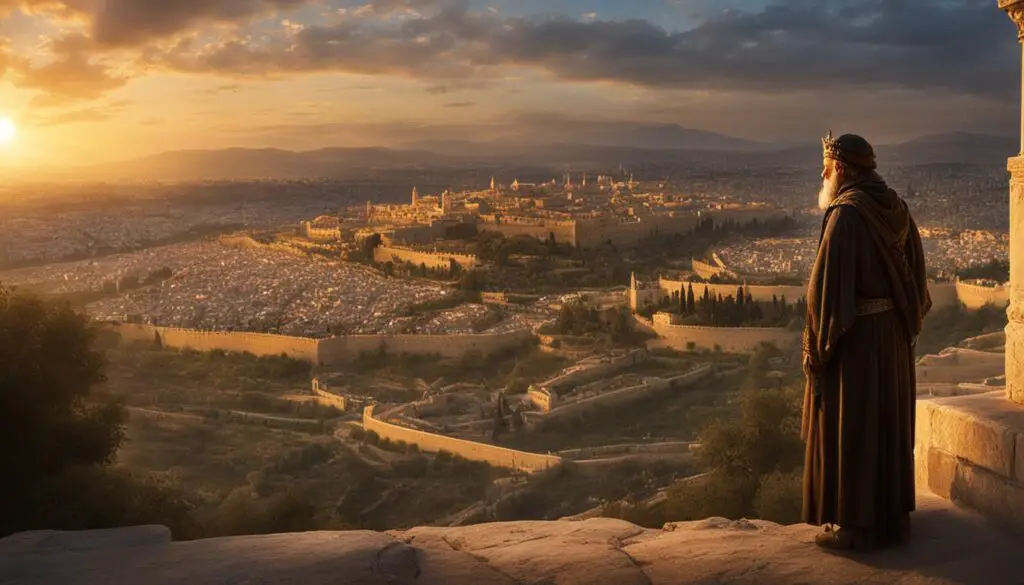
Jerusalem in Biblical Times
In biblical times, Jerusalem was a vibrant city that played a central role in religious and political life. It served as the capital of the Kingdom of Israel and was the center of worship for the Jewish people. Jerusalem was a bustling city with a strategic location, making it a target for conquest by various empires throughout history.
The city was characterized by its Temple, where religious rituals were conducted, and it housed prominent political and religious figures. It was a hub of cultural exchange and trade, attracting people from different regions. Jerusalem’s importance in biblical times is evident in the accounts of David’s conquest of the city, Solomon’s construction of the First Temple, and the prophecies of Isaiah, Jeremiah, and other prophets.
| Key Information | Details |
|---|---|
| Capital | Jerusalem was the capital of the Kingdom of Israel. |
| Religious Center | Jerusalem served as the center of worship for the Jewish people. |
| Cultural Exchange | Jerusalem attracted people from different regions, resulting in a vibrant cultural scene. |
| Strategic Location | Jerusalem’s strategic location made it a target for conquest by various empires. |
Ancient Jerusalem was a city steeped in religious significance, cultural diversity, and political power. It played a pivotal role in shaping the history and beliefs of the Jewish, Christian, and Islamic traditions. Exploring Jerusalem in biblical times provides a glimpse into a world where faith, power, and identity intersected to create a city that continues to captivate visitors to this day.
The Marvelous History of Jerusalem: Major Biblical Events
Jerusalem, the ancient city of immense biblical importance, has witnessed several major events that have shaped its history. These events, rooted in the religious beliefs of Judaism, Christianity, and Islam, have left a lasting impact on the city, making it a significant pilgrimage site for millions around the world.
The Construction of the First and Second Temples
One of the most significant biblical events in Jerusalem was the construction of the First and Second Temples. The First Temple, built by King Solomon, was a place of worship and the center of religious life for the Jewish people. Its magnificent architecture and religious significance attracted worshippers from far and wide. However, the temple was later destroyed by the Babylonians in 586 BCE.
After the Babylonian exile, the Second Temple was constructed on the same site. It became the spiritual and cultural focal point for the Jewish community, symbolizing their resilience and devotion. However, this temple too met its fate and was demolished by the Romans in 70 CE.
The Crucifixion of Jesus and the Ascension of Muhammad
Jerusalem is also a city of great importance in Christian and Islamic traditions. It is believed that Jesus was crucified in Jerusalem, marking a pivotal moment in Christian theology. The Church of the Holy Sepulchre, located in the heart of Jerusalem, is revered as the site of Jesus’ crucifixion, burial, and resurrection.
In Islamic tradition, Jerusalem is associated with the ascension of the Prophet Muhammad to heaven during the Night Journey. The Dome of the Rock, an iconic structure situated on the Temple Mount, is believed to mark the spot from where Muhammad ascended. Its golden dome is a symbol of Jerusalem’s religious significance to Muslims worldwide.
| Biblical Event | Significance |
|---|---|
| The Construction of the First Temple | Established Jerusalem as a religious and political center for the Jewish people. |
| The Construction of the Second Temple | Symbolized the restoration of Jewish worship after the Babylonian exile. |
| The Crucifixion of Jesus | Central event in Christian theology, marking Jesus’ sacrifice for humanity. |
| The Ascension of Muhammad | Highlights Jerusalem’s significance as a holy site in Islamic tradition. |
These major biblical events have left a profound impact on Jerusalem’s history and continue to shape its cultural and religious identity. Today, visitors to Jerusalem can explore the remnants of the ancient temples, walk in the footsteps of Jesus along the Via Dolorosa, and marvel at the sacredness of the Dome of the Rock. The city stands as a testament to the intertwining of faith and history, offering a mesmerizing journey through time for all who visit.
Jerusalem Today
Jerusalem, with its incredible historical and religious significance, is a city that offers a multitude of attractions and landmarks for visitors to explore. From ancient architectural wonders to vibrant cultural experiences, Jerusalem truly has something for everyone.
One of the must-visit attractions in Jerusalem is the Western Wall, also known as the Wailing Wall. This iconic site holds great significance for Jews and is a place of prayer and reflection. Another notable landmark is the Church of the Holy Sepulchre, believed to be the site of Jesus’ crucifixion and resurrection. Visitors can also marvel at the Dome of the Rock, an impressive Islamic shrine with breathtaking intricate details.
When exploring Jerusalem, be sure to visit the Mount of Olives, which offers panoramic views of the city and is home to ancient Jewish graves. The Tower of David is another fascinating historical site that showcases the city’s rich history through immersive exhibits and stunning views from its ramparts. To delve deeper into Jerusalem’s past, the Israel Museum is a must-visit, housing an extensive collection of archaeological artifacts and cultural treasures.
| Attraction | Description |
|---|---|
| Western Wall | An important religious site for Jews, offering a place of prayer and reflection |
| Church of the Holy Sepulchre | The believed site of Jesus’ crucifixion and resurrection |
| Dome of the Rock | An iconic Islamic shrine with stunning architectural details |
| Mount of Olives | Offers panoramic views of Jerusalem and houses ancient Jewish graves |
| Tower of David | A historical site with immersive exhibits and magnificent city views |
| Israel Museum | Home to a vast collection of archaeological artifacts and cultural treasures |
Immerse yourself in the vibrant culture of Jerusalem by exploring the bustling markets of the Old City. From aromatic spices to handmade crafts, these markets offer a sensory experience like no other. Don’t forget to try traditional culinary delights such as falafel, hummus, and freshly baked bread.
With its rich history and diverse cultural heritage, Jerusalem continues to captivate visitors from around the world. Whether you’re seeking spiritual enlightenment or simply want to soak in the city’s unique atmosphere, Jerusalem’s attractions and landmarks are sure to leave a lasting impression.
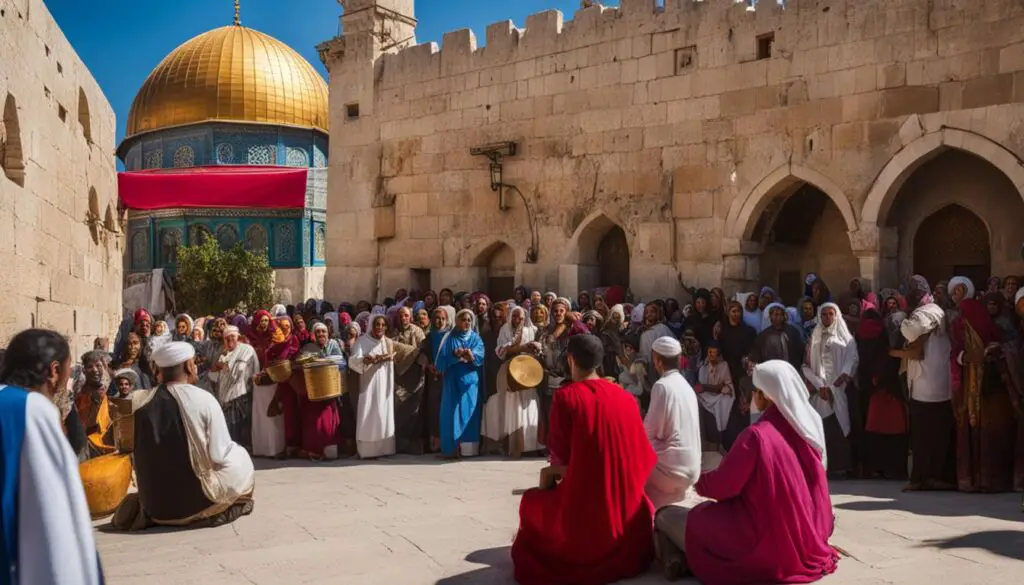
Jerusalem’s Cultural Significance
Jerusalem is not just a city of historical and religious importance; it is also a vibrant hub of cultural expression. The city is a melting pot of diverse traditions, where Jewish, Christian, and Muslim cultures coexist and intertwine. This unique blend of cultural influences gives Jerusalem its distinct character and makes it a captivating destination for travelers.
Visitors to Jerusalem can immerse themselves in the city’s rich cultural heritage through various experiences. Festivals celebrating different religious and cultural traditions take place throughout the year, offering a glimpse into the vibrant tapestry of Jerusalem’s culture. From the solemn processions of Holy Week to the lively music and dance performances during Ramadan, there is always something happening in Jerusalem that showcases its cultural diversity.
Art and cuisine also play a significant role in Jerusalem’s cultural scene. The city is home to numerous art galleries and museums, featuring works by local and international artists. Traditional and modern art forms coexist, offering visitors a chance to explore different artistic expressions. Similarly, Jerusalem’s culinary scene is a reflection of its multicultural heritage. From traditional Middle Eastern dishes to international fusion cuisine, there are endless culinary delights to sample and enjoy.
Exploring Jerusalem’s cultural significance is an essential part of any visit to the city. Whether attending a cultural festival, visiting an art gallery, or indulging in local cuisine, travelers can truly immerse themselves in the vibrant cultural scene of Jerusalem and gain a deeper understanding of its rich heritage.
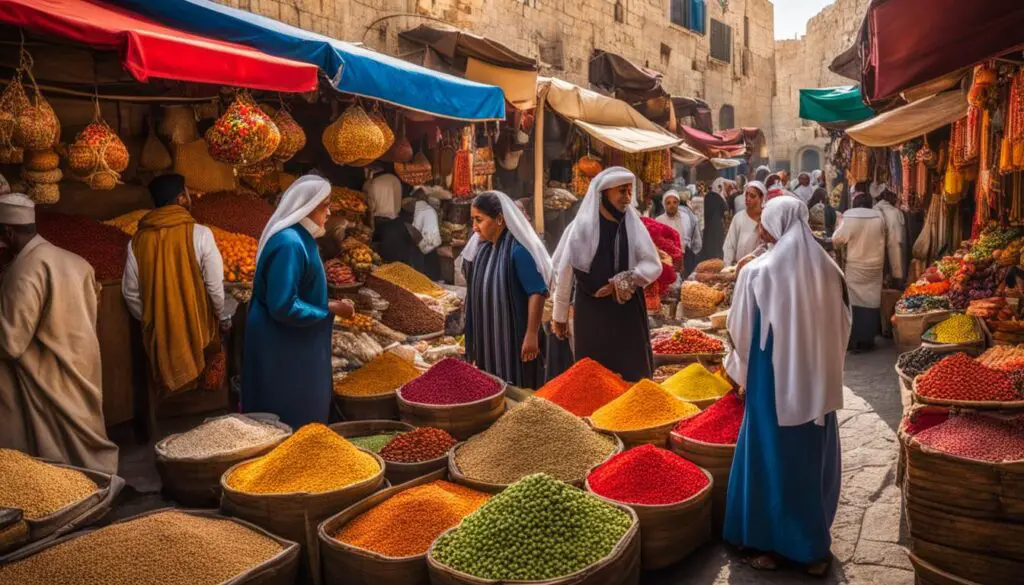
Table: Cultural Highlights in Jerusalem
| Cultural Event | Description |
|---|---|
| Jerusalem International Film Festival | An annual event showcasing the best of international and Israeli cinema. |
| Jerusalem Light Festival | A dazzling display of light installations and projections that transform the city’s landmarks. |
| Mahane Yehuda Market | A bustling market offering a sensory experience of aromas, flavors, and colors. |
| Israel Museum | Home to a vast collection of art and artifacts, including the famous Dead Sea Scrolls. |
| Jerusalem Theater | A cultural hub hosting theater performances, concerts, and dance shows. |
Best Places to Visit in Jerusalem
When exploring the beautiful city of Jerusalem, there are several must-visit places that showcase its historical and religious significance. These landmarks are not only visually captivating but also provide insights into the city’s rich cultural heritage.
The Western Wall: A Sacred Site for Jews
The Western Wall, also known as the Wailing Wall, is a significant religious site for Jews and one of the most visited attractions in Jerusalem. It is believed to be the last remnant of the Second Temple and is considered a place of prayer and reflection. Visitors can witness the devotion of worshippers who come to place handwritten notes in the wall’s crevices, a tradition that dates back centuries.
The Church of the Holy Sepulchre: A Place of Christian Pilgrimage
The Church of the Holy Sepulchre is another must-visit landmark in Jerusalem, revered by Christians worldwide. It is believed to be the place where Jesus was crucified, buried, and resurrected. Within the church, visitors can explore various chapels and witness religious ceremonies conducted by different Christian denominations.
The Dome of the Rock: An Iconic Islamic Symbol
The Dome of the Rock is an iconic symbol of Jerusalem and one of the most important Islamic sites in the world. Located on the Temple Mount, it is adorned with dazzling tiles and a golden dome, making it a visual masterpiece. Visitors can admire the intricate architecture and experience the serene atmosphere surrounding this sacred place.
Table: Must-Visit Places in Jerusalem
| Landmark | Description |
|---|---|
| The Western Wall | A sacred site for Jews; the last remnant of the Second Temple. |
| The Church of the Holy Sepulchre | A significant Christian pilgrimage site; believed to be the place of Jesus’ crucifixion and resurrection. |
| The Dome of the Rock | An iconic Islamic symbol located on the Temple Mount; showcases stunning architecture. |
These are just a few of the many remarkable places to visit in Jerusalem. Each site offers a unique glimpse into the city’s rich history and religious traditions. Whether you are exploring the Western Wall, the Church of the Holy Sepulchre, or the Dome of the Rock, you are sure to be awe-inspired by the cultural and historical significance that Jerusalem holds.
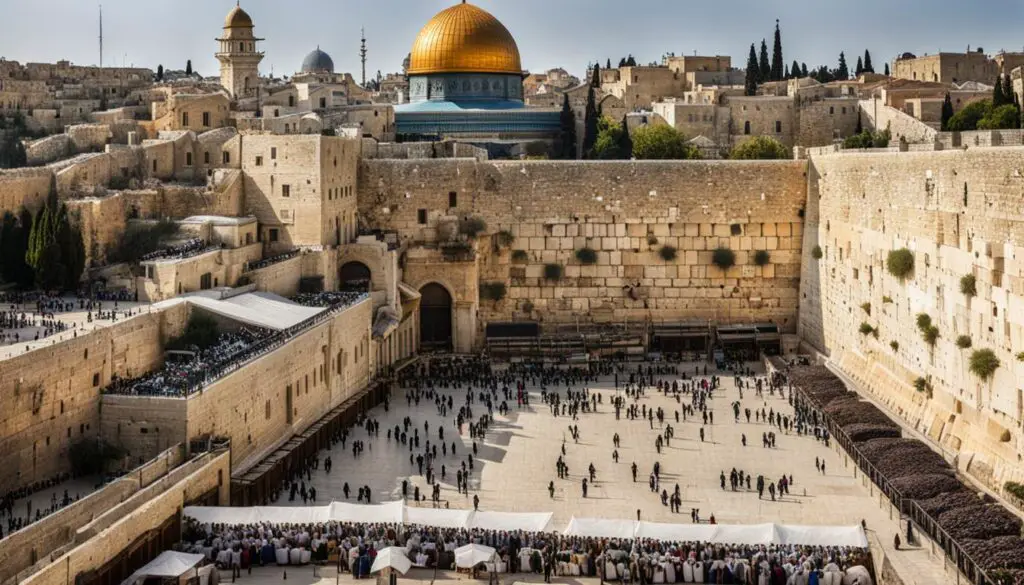
Conclusion
Jerusalem, a city of immense historical and religious significance, offers a captivating journey through time. With its rich history and biblical importance, Jerusalem remains a destination that attracts visitors from around the world. Notable biblical figures, such as King David, King Solomon, Jesus, and Muhammad, are linked to this sacred place, adding to its allure.
In biblical times, Jerusalem served as the capital of the Kingdom of Israel and played a central role in religious and political life. The city was fortified and featured the magnificent Temple where worship was conducted. Its strategic location attracted various empires seeking to conquer it throughout history.
Jerusalem witnessed major biblical events that have shaped its history. The construction of the First and Second Temples, the crucifixion of Jesus, and the ascension of Muhammad all took place within its sacred borders. These events continue to influence the city’s cultural, religious, and historical landscape.
Today, Jerusalem remains a vibrant destination, offering visitors a chance to explore its ancient sites and experience its unique cultural heritage. From the Western Wall and the Church of the Holy Sepulchre to the Dome of the Rock and the Mount of Olives, there are countless landmarks to discover. A comprehensive Jerusalem travel guide can help visitors navigate the city and fully appreciate its timeless beauty.
FAQ
What is the biblical importance of Jerusalem?
Jerusalem is mentioned numerous times in the Bible and is considered a holy city by three major religions. It is associated with notable biblical figures such as King David, King Solomon, and Jesus. Jerusalem served as the capital of the Kingdom of Israel and was the center of religious worship.
Who are some notable biblical figures linked to Jerusalem?
King David, King Solomon, Jesus, and Muhammad are some of the notable biblical figures linked to Jerusalem. King David is revered as the founder of the city, while King Solomon is renowned for building the First Temple. Jesus spent the final days of his life in Jerusalem, and Muhammad is believed to have ascended to heaven from there.
What was Jerusalem like in biblical times?
In biblical times, Jerusalem was a thriving city and served as the capital of the Kingdom of Israel. It was fortified and played a central role in religious and political life. The city had a Temple where religious rituals were conducted and was a hub of cultural exchange and trade.
What are some major biblical events that took place in Jerusalem?
Jerusalem witnessed major biblical events such as the construction of the First and Second Temples, the crucifixion of Jesus, and the ascension of Muhammad. These events have shaped the city’s history and religious significance.
What are some must-visit places in Jerusalem?
Jerusalem is home to numerous attractions and landmarks. Some of the must-visit places include the Western Wall, the Church of the Holy Sepulchre, the Dome of the Rock, the Mount of Olives, and the Israel Museum. Visitors can also explore the bustling markets of the Old City and sample traditional culinary delights.


